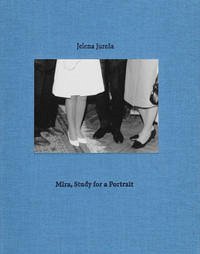Jelena Jureša’s book is a part of a long-term and multi-layered project in which the artist meticulously dealt with the history of one woman, one family and one country. She is tracing Mira's life and the story of the Perera family, a family of Sephardi Jews and their life in prewar Bijeljina, Bosnia: from the period before her birth, her childhood, life in Belgrade, in Sarajevo, the birth of her children, marriage, divorce, her work in an old people’s home until her tragic death in 1990, where riots soon broke out heralding the beginning of war in Croatia and the fragmentation of former Yugoslavia.
Das Cover von Mira, Study for a Portrait mag mit seinem in Leinen eingearbeiteten Schnappschuss an ein Familienalbum erinnern, aber es erzählt nicht nur die Reise einer Frau durchs Leben, sondern parallel die Geschichte einer Nation und wie sie sich in einen verheerenden Bürgerkrieg fallen lassen wird. Jelena Jureša begibt sich auf die Spuren Miras, der Perera-Familie, Sephardischer Juden, und ihrem Leben in Bijeljina, im Vorkriegs-Bosnien. Sie überprüft die Vielschichtigkeit von Foto- und Mikronarrativen und die Konstruktion eines Andenkens an eine Familie aus dem Balkan. Miras sehr persönliche Lebensgeschichte wird anhand von vorgefundenem und eigenem an den Schauplätzen der Geschichte aufgenommenem fotografischen Material wiederhergestellt. Jurešas Arbeit zeigt starke transdisziplinäre Tendenzen auf: kunsthistorisches, theoretisches und soziales Interesse fokussiert sie in einer Arbeit, die sich medienreflexiv mit den Bedingungen der Fotografie und des Films auseinandersetzt.
Das Cover von Mira, Study for a Portrait mag mit seinem in Leinen eingearbeiteten Schnappschuss an ein Familienalbum erinnern, aber es erzählt nicht nur die Reise einer Frau durchs Leben, sondern parallel die Geschichte einer Nation und wie sie sich in einen verheerenden Bürgerkrieg fallen lassen wird. Jelena Jureša begibt sich auf die Spuren Miras, der Perera-Familie, Sephardischer Juden, und ihrem Leben in Bijeljina, im Vorkriegs-Bosnien. Sie überprüft die Vielschichtigkeit von Foto- und Mikronarrativen und die Konstruktion eines Andenkens an eine Familie aus dem Balkan. Miras sehr persönliche Lebensgeschichte wird anhand von vorgefundenem und eigenem an den Schauplätzen der Geschichte aufgenommenem fotografischen Material wiederhergestellt. Jurešas Arbeit zeigt starke transdisziplinäre Tendenzen auf: kunsthistorisches, theoretisches und soziales Interesse fokussiert sie in einer Arbeit, die sich medienreflexiv mit den Bedingungen der Fotografie und des Films auseinandersetzt.
